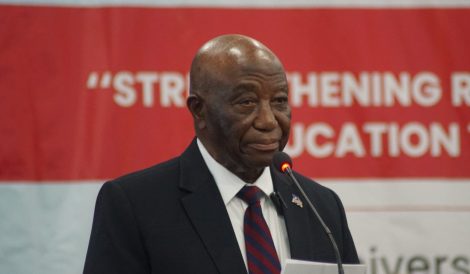UL College of Health Sciences, Yale, Vanderbilt Receive USD15m Health Research Utilization USAID Grant
On July 20, 2021, The United States Agency for International Development (USAID) announced a US$15 million project aimed at establishing a public-private-academic hub for research utilization in the Liberian health sector. The funds are part of USAID’s Bringing Research to Impact for Development, Global Engagement, and Utilization (BRIDGE-U) partnership project. Collaboratively, Yale University, Vanderbilt University, and the University of Liberia College of Health Sciences (ULCHS) will create the Center for Teaching, Learning, and Innovation (CTLI) in Liberia.
This committal comes as a result of these Universities’ joint project titled “Applying Research for a Healthy Liberia (AR4HL)” and runs from June 11, 2021, to June 10, 2026.
UL College of Health Sciences Vice President and Principal Investigator Dr. Bernice Dahn, reflecting on the significance of the much-needed project indicated “Many donor-funded projects implement programming without building systems to install long-term institutional knowledge or capacity for independent initiatives within the host country institutions. We have designed this project with systems-building and institutional sustainability at its core, and we are looking forward to the results.”
The project is expected to impact long term research and training collaboration throughout Liberia’s health sector and institutionalize income generating activities and administrative systems. Hence, AR4HL will transition to a national public-private-academic research and training hub at the end of the project.
Commenting on the prospects of the partnership, Yale School of Medicine Principal Investigator, Assistant Professor Kristina Talbert-Slagle described the universities’ partnership as mutually trusting, adding “We have built a mutually trusting partnership focused on fulfilling the vision and goals of our partners in Liberia, and we are excited to continue working together to establish permanent academic programs and robust administrative systems at ULCHS with this award.”
This partnership builds on multi-years of partnership with the shared goal of enhancing Liberia medical and health science education. Since 2015, the University of Liberia College of Health Sciences, Liberia’s Ministry of Health, Liberian College of Physicians and Surgeons, and U.S. academic institutions including Yale and Vanderbilt have conducted collaborative research and created new programs to build capacity within Liberia’s health workforce.
By implementing evidence-based programming, AR4HL’s primary objective is to connect faculty, students, policymakers, clinicians and entrepreneurs to optimize research-driven practice throughout the health sector for nationwide development impact to be achieved through its cornerstone activity to operationalize a Center for Teaching, Learning, and Innovation at ULCHS.
Meanwhile, Vanderbilt University Principal Investigator Marie Martin, Assistant Professor of Health Policy and Associate Director for Education and Training at VIGH, hailed the grant as an incredible next step. “This grant is an incredible next step in realizing our collective vision of a stronger and healthier Liberia through intentional capacity building initiatives. It builds on the productive partnership we have established with ULCHS and Yale to strengthen medical training, subspecialty capacity and research training in the country,” Martin said.
Applying Research for a Healthy Liberia stretches beyond hosting faculty development training based on the team’s existing research but also addresses Liberia’s undeniable need for mentoring students in science and research. Hence, a secondary school program, Camp xSEL is designed to prepare young Liberians, especially girls, to pursue higher education in science and to engage in research.
AR4HL also provides an interprofessional capstone course through which ULCHS faculty and students can conduct research projects examining how to translate research outputs into development impact while building their research utilization competencies. Further, the Center will also house an Experiential Learning and Assessment Lab (ELAB) utilizing state-of-the-art manikins to offer evidence-based simulation training to health sciences students and practicing clinicians, while CTLI will design and deliver a Certificate in Evidence-Based Health Policy for current policymakers. iLab Liberia and the Consortium for Improving Medicine with Innovation and Technology (CIMIT) will implement innovation programming focused on identifying, cultivating, and supporting female entrepreneurs to develop commercial applications of health-related research.
Collectively, these activities are anchored at ULCHS and will ultimately result in increased capacity across Liberia’s health sector in evidence-based health sciences teaching and patient care, utilization of research for health policymaking, innovative commercial applications of health research findings, and sustainable financing for health research and utilization programs in Liberia.

